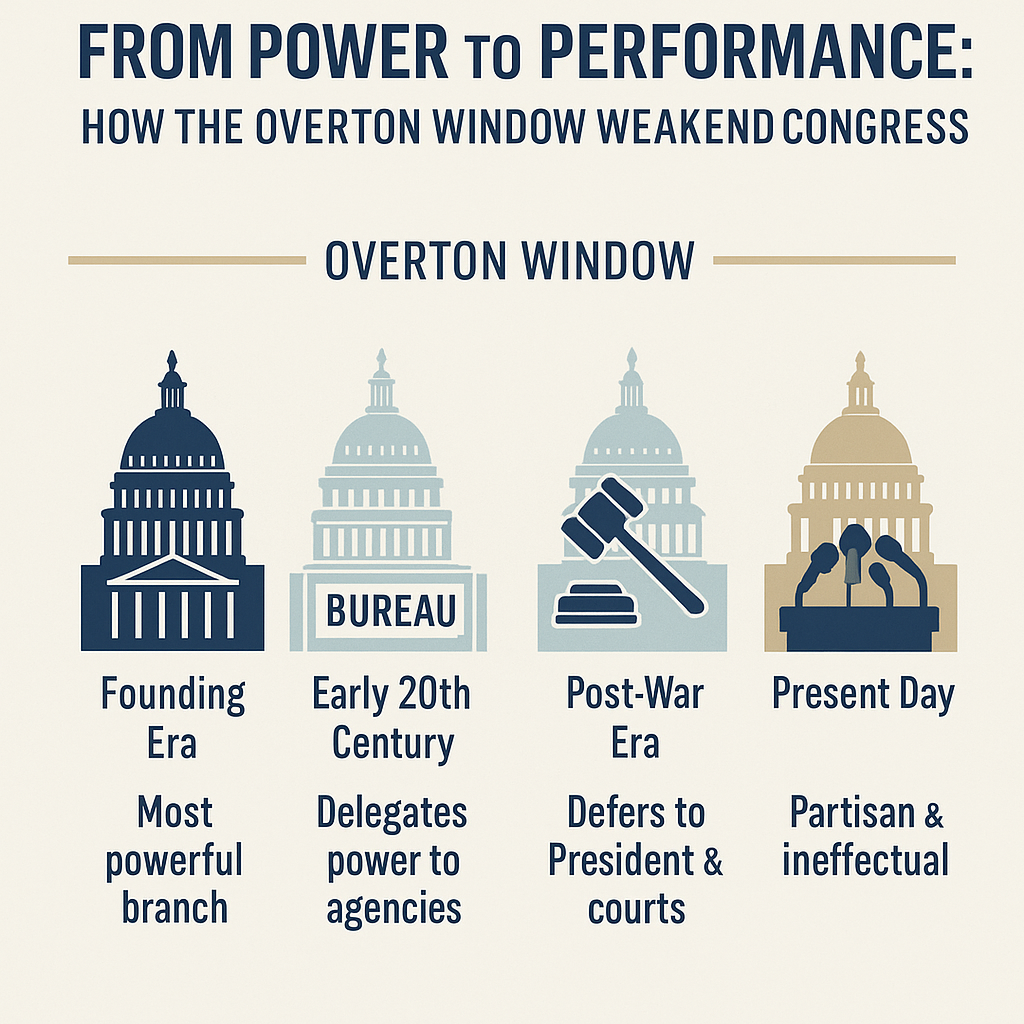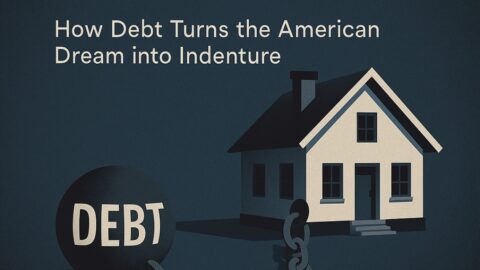Here is a detailed article examining how the Overton Window has shifted the Legislative Branch from the most powerful and representative branch in the Founders’ design to a weakened, partisan, performative body that often defers to the Executive, the Judiciary, and unelected bureaucracies.
From First Among Equals to Irrelevant Theater: How the Overton Window Weakened the Legislative Branch
“In republican government, the legislative authority necessarily predominates.”
—James Madison, Federalist No. 51
In the constitutional blueprint of the United States, Congress was meant to be king—not the President, not the Courts, and certainly not unaccountable agencies. As the direct representative of the people and the states, the Legislative Branch was given the power of the purse, the power to declare war, to make laws, and to impeach.
But today, Congress is often seen as:
- Gridlocked
- Dysfunctional
- Merely symbolic
And increasingly, legislation is made by executive orders, court rulings, or agency regulations—with little debate, transparency, or constitutional process.
This decline didn’t happen randomly. It’s the result of a decades-long shift in the Overton Window, moving Americans to accept the legislative branch’s impotence and expect stronger executive action and judicial activism instead.
I. The Founders’ Vision: Congress as the Center of Government
Intended Strengths:
- Most powerful branch (Article I = longest and most detailed)
- Bicameral structure to balance people (House) and states (Senate)
- Powers over taxation, spending, trade, war, impeachment, and appointments
- Created to be the chief guardian of liberty, not the President or the Courts
Why?
Because the Founders feared concentrated power—and the people’s house (Congress) was the most accountable to the public.
“The people are the only legitimate fountain of power.” – James Madison
II. The Overton Shift: From Lawmakers to Bystanders
| Era | Legislative Role | Overton Window Position |
|---|---|---|
| Founding–1800s | Core of federal power, robust debate | Expected & respected |
| Civil War–Early 1900s | Still dominant, begins delegating power | Gradual shift |
| New Deal Era (1930s) | Hands over regulatory control to agencies | Agencies make rules |
| Post-WWII – Cold War | Cedes war powers to Presidents | Congress avoids tough calls |
| Modern Era (1980s–Today) | Performative, partisan gridlock | Public sees Congress as irrelevant |
III. Key Catalysts of the Decline
1. Delegation to Bureaucracy (Administrative State)
- Congress passes vague frameworks, agencies write the details (EPA, ATF, IRS, CDC)
- This allows Congress to avoid blame while unelected bureaucrats govern
2. Avoidance of War Declarations
- Korea, Vietnam, Iraq, Syria, Libya—none had formal war declarations
- Presidents act unilaterally, Congress rubber-stamps
3. Erosion of the Power of the Purse
- Congress continues to approve omnibus bills, blank checks, and continuing resolutions without scrutiny
- Debt ceiling debates mask the reality: they don’t control spending anymore
4. Rise of the Filibuster and Gridlock
- Designed to protect minority opinion, the filibuster now paralyzes meaningful debate
- Most legislation is shaped by backroom deals, not public deliberation
5. Theatrics over Substance
- Hearings are now TV performances
- Legislators campaign on soundbites, not on lawmaking or restraint
- Public sees Congress as a circus, not a deliberative body
IV. Consequences of the Shift
- Loss of Accountability: Laws are written by unelected bureaucrats, not by those who face voters
- Rise of the Executive State: Presidents act by decree when Congress won’t act
- Judicial Tyranny: Courts settle political debates that Congress won’t touch
- Decline of Federalism: National laws supersede local/state decisions, fueled by centralized power
V. Why the Public Accepts It (Overton Window Psychology)
- People crave quick solutions, not deliberation
- Media focuses on Presidents and Courts, not Congress
- Civics education is nearly dead; people don’t understand Article I
- Stage 4 thinkers see “law” as what the President or Court says—not as the product of consent-based legislation
VI. What Must Be Restored
- Congress must reclaim war powers
- All regulations must be voted on by Congress, not just agencies
- Reinforce the power of the purse—no more blank check budgets
- Impose term limits or structural reforms to break incumbent inertia
- Educate Americans about the Constitution’s intended structure
Conclusion: The Branch That Gave Itself Away
Congress was designed to be the people’s firewall against tyranny. But it has abdicated its duties to unelected bureaucrats, imperial Presidents, and activist judges.
Today’s Congress is often little more than a pantomime of power—while real governance happens in agencies, courtrooms, or the Oval Office.
“The greatest danger to liberty is not the abuse of power—it’s the abandonment of responsibility.”
—Unknown
The people must push the Overton Window back toward civic expectation, legislative courage, and constitutional fidelity—before the legislative branch becomes fully irrelevant.






